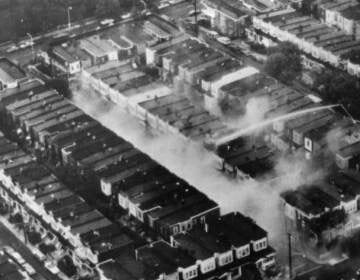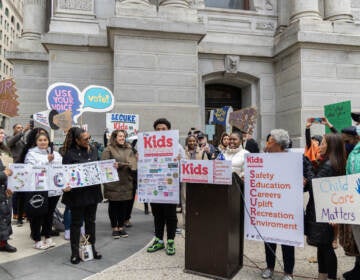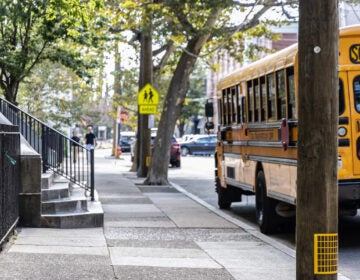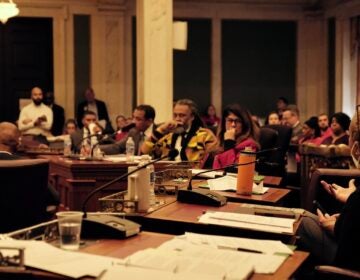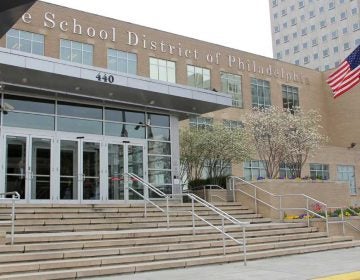Philly school board asks City Council for millions in funds: ‘We need you’
The board also asked the city at its biannual meeting to provide parking for teachers near some schools to address safety concerns.
Listen 2:01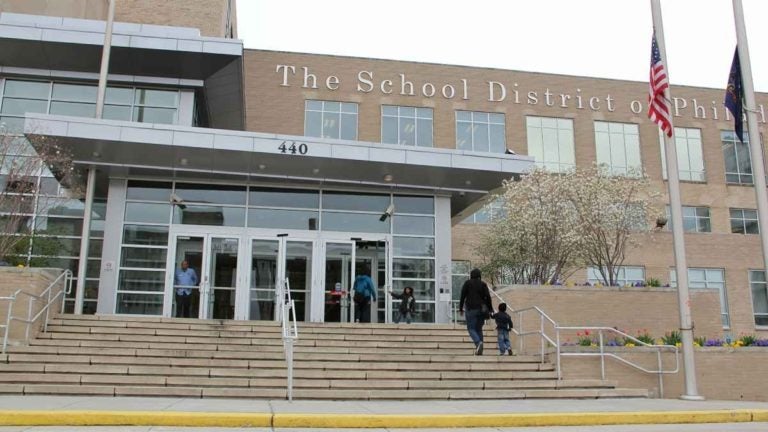
School District of Philadelphia. (Emma Lee/WHYY)
Philadelphia’s school board delivered a long list of asks to City Council this week, including a $318 million annual budget increase within the next four years.
Board vice president Mallory Fix-Lopez said the district can’t shoulder the burden of building repairs and other looming costs alone.
“We need our city and state partners to invest in our infrastructure so that we can accelerate the work we are doing,” Fix-Lopez said during the board and council’s biannual meeting Tuesday.
The ask was one of many during the more than four-hour-long meeting in which board members at times clashed with members of city council.
Philadelphia is the only school district in the state that can’t raise its own money. Instead, it relies on local, state, and federal funding. Research cited by board members shows the district needs an additional $1.14 billion annually to fully educate its students.
The district’s aging school buildings have been a source of tension in Philly for decades. The average school building was built in the 1950s and some are more than a century old. Many have outstanding issues with asbestos, lead, or mold. Most lack central air conditioning and the electrical capacity needed for an upgrade.
Fix-Lopez said the district’s deferred maintenance costs total $4.5 billion, according to a 2017 analysis. Eighty-five buildings should be considered for renovation and 21 buildings for closure and replacement, she said.
Last year, the district invested $325 million in federal stimulus funds on building repairs and renovations, Fix-Lopez said, bringing its total capital investment to $2 billion over the next six years.
Mention of the district’s lawsuit challenging a new law that requires the city to inspect all school buildings for safety issues by 2025 was conspicuously absent from the conversation. Until Councilmember and education committee chairperson Isaiah Thomas brought it up.
“I think that is the elephant in the room that a lot of people in the general public are concerned about,” Thomas said.
Board president Reginald Streater has said the lawsuit could unnecessarily threaten the opening of school buildings in the fall, since the first third of buildings must be certified safe by Aug. 1, 2023.
The lawsuit argues the city does not have the authority to close schools, that the law is vague and undeveloped, and that the district is already required to comply with other state and federal standards.
Thomas and others criticized the district when it filed the lawsuit less than two weeks ago. Some, including the law’s author, former Councilmember Derek Green, accused the district of failing to come to the table during the lawmaking process.
Streater addressed the criticism at the board’s monthly meeting last week.
“I want to make clear that the board and district did not file the lawsuit without having made multiple attempts to raise our concern both during the legislative process, and after the bill in question became law, before filing,” Streater said. “The lawsuit was filed because our concerns were not addressed.”
Streater didn’t say much Tuesday, but did say the board is interested in settling.
“The district is happy and willing to continue the negotiations in order to come to some resolution so that we all can get on the same page,” he said.
In addition to the $318 million ask, the board also asked the city to provide funding to expand Safe Paths, a grant-funded program that pays community members to monitor dismissal, stop fights, and walk students home. Other requests included more funding for libraries and recreation centers as well as increased mental health resources for families and schools.
The most controversial ask of the meeting was parking for teachers, which launched a wide-ranging discussion about safety and the district’s level of responsibility versus the city.
“Many of our schools do not have parking spaces. As a result, school-based staff might have to park blocks away from schools,” board member Chau Wing Lam said. “In neighborhoods where we have seen increases in violence, our school staff has safety concerns.”
Lam also suggested the city provide SEPTA passes, loan forgiveness, housing vouchers, and other incentives to help the district compete with more affluent suburban districts for teachers.
“I’m going to ask you to leave that whole parking issue alone,” Council President Darrell L. Clarke said. “God bless you on that one.”
But Fix-Lopez would not leave it alone.
“If we can’t figure out parking for public school teachers, I feel like we’re doomed as a city and we’re not going to be able to figure out public education,” she said.
She said the district is working hard to recruit and retain teachers, especially teachers of color, and that safety concerns are an obstacle for some schools.
“Thank you for chastising me,” Clarke said, describing his comment as “flippant.”
“The reality is this parking issue in the City of Philadelphia is an ever growing problem every day for everybody,” he said.
Councilmember Jim Harrity, who lives in Kensington, where gun violence and the opioid epidemic are acute, said when it comes to addressing crime, improved parking can’t be the priority.
“If your teachers are scared, how do you think my kids feel?” Harrity said. “I get you guys want parking, but we have other issues that we need to deal with, starting with the violence in that neighborhood and the things they have to see on their way to school.”
Mayor Jim Kenney, one of dozens of city and district officials on the lengthy and frequently tense call, suggested a shuttle system, where teachers park in a lot and are bussed to their school. Fix-Lopez said she appreciated the idea, but that the district doesn’t have the budget to pilot a program.
Fix-Lopez said safety is a city issue that the district is responding to, but can’t solve.
“I think that it’s a last ditch effort for us to ask for the parking support, because the city has not created safe neighborhoods in some places for teachers to actually teach,” she said. “If the city can’t make those areas safe, at the very least we could do is ask for parking closer to the schools for teachers.”
Philadelphia’s gun violence crisis has created a growing sense of tension between the city and the school district.
Superintendent Tony Watlington has repeatedly said while the district’s core responsibility is “teaching and learning,” out of necessity, its top priority has become safety.
More than 90 public school students have been shot so far this school year, 13 of them fatally. Some students have been injured walking to and from school, as recently as this Tuesday. And then there’s the case of 14-year-old Nicolas Elizalde, who was killed in September walking back to school from a football scrimmage at a nearby field.
Since then, the district has increased the amount of money it spends on security, in schools, as well as the surrounding community. Last week, the district’s board approved nearly $545,000 in grant funding to hire off-duty city police officers to patrol areas outside of schools and provide security at athletic events.
While the district appears to be moving with urgency, assistance from the city has been slow to materialize. In June, the city said it would spend $1.8 million to install new security cameras near the 19 district schools most impacted by gun violence. Some public schools have cameras, but they’re outdated and don’t provide real-time information, district safety chief Kevin Bethel recently said.
It took the city until November to survey the school sites, a city spokesperson said. The cameras still have not been purchased, the spokesperson said Tuesday, though the city aims to place the order by mid-February.
Council member Kenyatta Johnson said at Tuesday’s meeting that the cameras should have been installed already.
“Obviously we’re in a state of emergency,” Johnson said. “We have to work with a level of expediency around the issue.”
Some members of council used the meeting to call out the district’s academic performance. Philadelphia ranks near the bottom when compared to other large urban school districts. District-wide, 36% of students are proficient in reading and 22% in math.
“We’ve always made sure the district got their proper amount of funding, always,” Johnson said. “But we’ve never seen the needle move, to be quite frank with you, in terms of achievement of our young people.”
The district’s test scores have been largely stagnant for the last 10 years. Watlington, who succeeded William Hite in June, has promised to sunset academic programs that aren’t working and focus the district’s limited resources on research-based practices as part of his forthcoming strategic plan.
Steater said the district and the council need to join forces to support students. The two will meet again this spring at the district’s budget hearing.
“We need you,” he said. “Understand that it is our collective responsibility to come together.”
WHYY is your source for fact-based, in-depth journalism and information. As a nonprofit organization, we rely on financial support from readers like you. Please give today.


